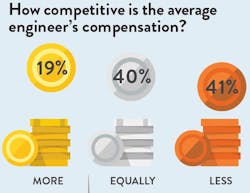According to the nearly 3,000 electrical engineers that participated in Electronic Design’s 2015 Compensation Survey, the engineering profession is in a period of transition. On the one hand, companies are still in the process of recovering from the economic recession and risk-averse corporate culture. On the other hand, companies are competing for engineering expertise for the Internet of Things.
Download the full, 12-page Salary Survey PDF complete with high-resolution infographics.
With priorities shifting out of cost management and into technology development, the employment outlook improved slightly over the last year. In general, companies are increasingly motivated to hire experienced engineers and pay to keep them. But at the same time, concerns about working conditions, job security, outsourcing, and continuing education have grown more entrenched in the mind of the typical engineer.
The majority of engineers anticipate that their companies will either maintain or increase hiring next year. But approximately 51% of respondents—a percentage that has been steadily rising over the last five years—noted that their companies were having difficulty finding qualified candidates, especially in embedded and software design. “Extreme specialization in engineering makes job mobility difficult on the technical path,” said one respondent, “and many employers seem to be unwilling to hire or train people who are merely close enough. The glut of engineers seeking work allows employers to be extremely choosy in hiring candidates.”
According to this year’s survey, almost two-thirds of engineers think a career in engineering and the potential for salary advancement is as promising as it was five years ago. In terms of total compensation, engineers reported an average compensation of $108,560, with bonuses and other incentives included, in 2015. (In contrast, the average compensation was $103,680 in 2010 and $106,482 in 2014).
Even though many respondents are concerned that compensation is not keeping pace with workflow, almost two-thirds of engineers felt that they were adequately compensated for their work this year. At the same time, the vast majority of engineers reported that they feel satisfied and intellectually challenged in their current positions.
In general, the engineering profession appears to be moving in a positive direction. However, many engineers may have to adjust their opinions slightly to what constitutes a positive employment outlook. The U.S. Labor Department Bureau of Labor Statistics (BLS) predicts that electrical and electronics engineers will have around 318,700 jobs in 2022—almost 50,000 more than in 2014, but also about 17,000 fewer jobs than the bureau recorded in 2013.
But perhaps most importantly, however, many engineers remain satisfied with a profession that affords them the opportunity to get paid for indulging in their passions.
James Morra, associate content producer at Electronic Design, wrote this report. Data conducted and compiled by Jay McSherry.
Gain access to the complete 2015 Salary Survey data. This 12 page PDF includes all of the data/editorial written in the online article and also features the following bonus material:Featuring: With Salaries Up, Where Do You Stand?, Keeping Up With Technology, The Impact of Outsourcing, Top Factors in Job Satisfaction, Preparing for the Internet of ThingsRegional salary and market data—where are the jobs, and how do salaries differ?A wealth of infographics that include valuable compensation dataHigh-resolution graphics and a printer-friendly format





